
Transcription
Clerk's Office
United States Court of Appeals
First Circuit
One Courthouse Way
Suite 2500
Boston 02210
Feb. 11, 2016
RE: James Riva Pro se v [names blanked out]
Appeals Ct. Nos. 15-2554
Dist Ct Nos. 1:14-cv-13048-FDS
Dear Sir or Madam Clerk,
I have been approved to proceed in forma pauperis on appeal. You should have received my authorization to take money from my prison account back in January along with my financial statements.
Enclosed is my brief (4 copies) and appendix (4 copies) and supplemental appendix (4 copies), certificate of service.
Please not that I am delivering this package to be mailed certified mail to the prison property room Thursday Feb. 11, 2016 but habitually the officials wait a long time to take it to the post office. The brief is due Feb. 22, 2016.
I am pleading in advance the mailbox rule because I know from experience how the officials are about legal packages. After all, this whole lawsuit is about the mail officer playing Hell with the mail.
Sincerely,
[signature]
James Riva Pro se
W38533
OCCC
1 Administration Rd,.
Bridgewater, MA 02324
UNITED STATES COURT OF APPEALS
FIRST CIRCUIT
Appeal Nos.
15-2554
US Dist. Ct. Nos.
1:14-cv-13048-FDS
James Riva Pro se
v
[names blanked out]
PRO SE APPELLANT'S BRIEF
James Riva Pro se
W38533
OCCC
One Administration Rd.
Bridgewater, MA 02324
TABLE OF CONTENTS:
Page Item
*,** Table of Authorities
1 Jurisdiction
2 Issues presented
3 Statement of the Case
3 Introduction
6 Standard of review
7 Summary of the Argument
14 Legal Argument
14 Issue One: Did the US dist Court err by applying the wrong standard of review where, instead of construing the pleadings in the light most favorable to the plaintiff, it adopted the inaccurate paraphrasing of the defendants - even with the same false quotation marks (quotes falsely attributed to Riva)?
22 Issue Two: Did the US dist Court err by applying the wrong standard of review when it treated the defendants' motion to dismiss as a motion for summary judgement - even tho discovery was not permitted?
22 Issue Three: Did the US dist Court err in misapplying the statute of limitations?
24 Issue Four: Should the US dist Court have allowed the plaintiff's request to recommend the case for criminal prosecution?
24 Issue Five: Did the US dist Court err in refusing to ascribe supervisory liability to defendants Fogaren, Carton, Mitchell, ladouceur, and Spencer?
26 Conclusion
26 Certificate of Compliance
27 Addendum
28-43 Order of Dist. Court dismissing complaint
44 Notice of appeal
45-51 docket entries
52 CERTIFICATE OF SERVICE
Appendix and supplemental appendix separately bound with alternate numbering system
TABLE OF AUTHORITIES
Page Item
21 Alsina-Ortiz v Laboy 400 F3d 77 (1st Cir 2005)
20 Amaker v Haponik 1999 US dist LEXIS 1568; 1999 WL76798 at 7 (S.S.N.Y.)
25 Anderson v Creighton 483 US 635 (1987)
19,20 Ashcroft v Iqbal 556 US 662 (2009)
20 Bieregu v Reno 59 F3d 1445 (3d Cir 1995)
25 Boradanaco v McLeod 871 F2d 1151 (1st Cir 1991)
23 Bruscino v Carlson 654 F Supp 609 (S.D. Ill. 1987)
20 Canell v Lightner 143 F3d 1210 (9th Cir 1998)
19 Carrero-Ojeda v Autoridad de Energia Electricia 755 F3d 711 (1st Cir 2014)
7 Centra Inc v Estrin 538 F3d 402 (6th Cir 2008)
23 Crocks v Townsend Oil Co. 464 Mass 1 (2012)
23 Cuddyer v Stop & Shop Supermarkets Co. 434 Mass 521 (2001)
7 Dennis v Osram Sylvania Inc. 549 F3d 851 (1st Cir 2008)
21 Estelle v Gamble 429 US 97 (1976)
25 Fernandez v Chardon 681 F2d 42 (1st Cir 1982)
22 Foley v Wells Fargo Bank 772 F3d 63 (1st Cir 2014)
21 Ford v Bender 2012 US Dist LEXIS 10090
19 Grajalas v P.R. Ports Auth 682 F3d 40 (1st Cir 2012)
20 Griffin v Lombardi 946 F2d 604 (8th Cir 1994)
24 Gross v United States 676 F2d 295 (9th Cir 1982)
1 Haines v Kerner 404 US 519 (1972)
20 High v Rowe 449 US 5 (1980)
21 In re Kemler 136 US 436 (1890)
TABLE OF AUTHORITIES (cont.)
Page Item
24 Maslaukas v United States 583 F Supp 349 (D. Mass 1984)
6, 7 Maz partners LP v PHC Inc. 762 F3d 138 (1st Cir 2014)
19, 24 Medina-Velazquez v Hernandez-Gregorat 767 F3d 103 (1st Cir 2014)
21 Michaud v Sheriff Essex Co. 390 Mass 523 (1983)
25 Miranda v Munoz 770 F2d 255 (1st Cir 1985)
6,14,19,Ocasio-Hernandez v Fortuno-Burset 640 F3d 1 (1st Cir 2011)
20,24
21 O'Connor v Huard 117 F3d 12 (1st Cir 1997)
1 Reardon v Commissioner of Correction 20 Mass App Ct 946 (1985)
19 Rodriquez-Reyes v Molina-Rodriguez 711 F3d 49 (1st Cir 2013)
24 Rourke v City of Providence 235 F3d 713 (1st Cir 2001)
20 Rowe v Shake 196 F3d 778 (7th Cir 1999)
20 Shaheed Muhammad v DiPaolo 138 F Supp 2d 99 (D. Mass 2005)
25 Thomas v Rufo 1994 US Dist LEXIS 8790 (April 20, 1994)
6 United States v Delgado-Marrero 744 F3d 167 (1st Cir 2014)
20 Van Cleave v United States 854 F2d 82 (5th cir 1998)
23 Washington v James 782 F2d 1134 (2d Cir 1986)
6 United States v Pelletier 666 F3d 1 (1st Cir 2011)
21 Wilkerson v Utah 99 US 130 (1879)
20 Williams v Ollis 230 F3d 136 (6th Cir 2000)
Jurisdiction:
The United States Court of Appeals First Circuit has jurisdiction to consider the instant appeal of a dismissed civil action under Article III Section 2 of the United States Constitution. More specifically, this case was brought under United Stats Constitution Amendment I, (This cause of action was stated on the civil cover sheet, but plaintiff being pro se and entirely distraught over what the defendants are doing to his mail, he did not write Amendment I in the cause of action paragraph. This Amendment I cause of action was fully articulated in the complain and response to defendants' motion to dismiss, therefore plaintiff appellant pleads the Court construe the cause of actions liberally because plaintiff appellant has never been to law school, and has no emotional detachment from the defendants' actually psychological torturing him for an unusually protracted period of time, Haines v Kerner 404 US 519, 520 (1972); Reardon v Commissioner of Correction 20 Mass App Ct 946, 947 (1985).)
Plaintiff appellant has also stated in his cause of action paragraph a 6th Amendment claim (briefed in full later), a major 8th Amendment cause of action, and a Due process cause of action. More specifically plaintiff appellant Riva brought this suit under Title 42 section 1983,; the Massachusetts Declaration of Rights under c 258, and c 12 sections 11H and 11I.
ISSUES PRESENTED:
1.) Did the US District Court err by applying the wrong standard of review where, instead of construing the pleadings in the light most favourable to the plaintiff, it adopted the inaccurate paraphrasing of the defendants - even with the same false quotation marks?
2.) Did the US District Court err by applying the wrong standard of review where it treated the defendants' motion to dismiss under rule 12 as a motion for summary judgement - even though no discovery was permitted?
3.) Did the US District Court err in misapplying the statute of limitations?
4.) Should the US District Court have allowed plaintiff's request to recommend the case for criminal prosecution?
5.) Did the US District Court err in refusing to ascribe supervisory liability to defendants Fogaren, Carton, Mitchell, Ladouceur and Spencer?
that [blanked out] diverted, destroyed, disappeared an entire one year subscription to "Prison Legal News" a newspaper that offers helpful cases to prisoners litigating Pro se.
[blanked out] also stole documents related to Riva's pursuit of his father's estate in Probate Court - he offered direct evidence (the postmarked legal envelopes) that proved by dramatically different weights that the envelope that defendants claim the death certificate and other papers came in actually weighed quite a bit more, (a difference in postage of 44c and $1.68).
Judge Saylor, instead of construing the facts in the light most favorable to Riva, instead used the same mistaken paraphrasing the defendant's used in their memorandum, complete with the same quotation marks, (for example, he parroted the defendants' claim that Riva complained of excessive "mouthchecks" while Riva instead complained that defendant [blanked out] was pretending that Riva was refusing to obey the order to lift his tongue in the med line - to escalate into a lockup for Riva to the hole. Riva always complies with mouthchecks the whole 36 years he has been in prison. Never once has Riva been discovered to have hidden a pill).
Judge Saylor also parroted the defendant's misquote paraphrasing stating that Riva's cause of action against defendant [blanked out] was that he wrote a false disciplinary report on Riva. He did write a false report, however Riva defeated the false report and got it dismissed. That was not the cause of action. The cause of action was that in retaliation for Riva defeating [blanked out] bogus report, [blanked out] broke Riva's typewriter irreparably and then Riva had to buy a replacement from the repair shop for $95.00 without a warranty.
The supervisors [names blanked out] and [blanked out] all were fully apprised by grievance appeals and the same exhibits that appear in Riva's 159 page appendix of the culpability of [names blanked out] and [blanked out]. To this day, [blanked out] is still in the mailroom. To this day, [blanked out] is in a position of responsibility supervising prisoners. To this day, [blanked out] is still allowed to do mouth checks in the med line. Defendant [blanked out] has never taken any action against these three to protect Riva or any other inmate from their strange habits.
Standard of Review:
Dismissal of plaintiff Riva's claims under rule 12 motion is reviewed de novo; Ocasio-Hernandez v Fortuno-Burset 640 F3d 1, 7 (1st Cir 2011). Review of evidentiary findings and motion to appoint counsel are under the abuse of discretion standard; United States v Pelletier 666 F3d 1, 5 (1st Cir 2011); United States v Delgado-Marrero 744 F3d 167, 179 (1st Cir 2014). Where it appears that the judge treated defendants' motion to dismiss as a motion for summary judgement, and no discovery was permitted, review is de novo; Maz Partners LP v PHC Inc. 762 F3d 138, 144 (1st Cir 2014); Centra Inc. v Estrin 538 F3d 402, 420 (6th Cir 2008); while review of denied discovery motion (no discovery was permitted) is under the abuse of discretion standard, Dennis v Osram Sylvania Inc. 549 F3d 851, 859 (1st Cir 2008).
Summary of the Argument:
Contrary to the judge's dismissive remarks, Riva did proffer a lot more than just "grievance appeals" in his 159 page appendix of evidence. The denied grievance appeals were direct evidence of [blanked out] supervisors' refusal to remove [blanked out] from the mail room after being presented with a huge volume of direct evidence he was stealing, diverting, and otherwise tampering with the mail - thus Riva's claims of supervisory liability should have been addressed. It was a well briefed issue and Judge Saylor did not comment on it. But in addition to the denied "grievance appeals" there were a large number of exhibits, (Append 81, 88, 90-93, 103-105, 115, 116, 122, 123, 127, 132, 134) which comprised Riva's blocked out pen friends ([blanked out] illegal blockade) finally managing to slip a letter past [blanked out] net in which they complain of Brasseur stealing the mail - even a $20. money order that was cashed by someone (Append 81). One pen friend complained to Riva asking why did he ask her what she looks like when you know from the picture I sent you and you wrote back and said put some clothes on. Riva never received the letter with picture and he never wrote the letter telling her to put some clothes on (Append 88). Weird. Illegal.
This is a well pleaded First Amendment cause of action. Riva stated a 1st Amendment cause of action on the civil action cover sheet, he articulated a 1st Amendment cause well enough, but he neglected to write it in his paragraph on cause of action; he pleads that he is Pro se and absolutely tortured by the defendants, and has no emotional detachment from the pleadings. Thus the Court should construe Riva's pleadings liberally. What is important is enough well pleaded facts, which Riva has an abundance of, Judge Saylor's remarks notwithstanding.
Inmates have a First Amendment right to send and receive mail. [blanked out] pattern of conduct is such as to deprive Riva over a 9 year stretch of time (closer to 10 years), and Riva claims it was a continuous tort. [blanked out] is in the unique position to be able to steal any evidence against him as it arrives in the mail. He steals, then he steals to conceal his previous stealing, and so on ad nauseum. His supervisor's obviously approve of his mistreatment of Riva because they refuse to remove him from the mail room. Riva had to accumulate enough evidence to establish a pattern of conduct rather than a few isolated instances that do not amount to a cause of action. Not only do they refuse to remove him, but they alter evidentiary findings to conceal his behavior (Append 55, 69, 70, 71, 72) where defendants wilfully meld two different articles of mail together to conceal theft of legal documents from Probate Court (Riva's father's estate).
All that is necessary to toll the statute of limitations under the continuing violation doctrine is that it persisted for a significant period of time, and that it is anchored by a least one instance of tortuous conduct within the statute of limitations - a requirement Riva adequately fulfilled, yet Judge Saylor made no comment about this vital tolling premise - dismissively stating that all offenses occurring before July 2011 were time barred.
Riva spent a good deal of writing space in his complaint to the US District Court explaining his particular problems (life-long) with schizophrenia. This a pre-existing injury which the defendants collectively sought to aggravate and in fact they did so to the extent that prison mental health wrongly concluded that Riva's belief his mail is being stolen is a delusion, and therefore Riva is dangerous. They over-drugged him with anti-psychotics for a whole year until Riva finally convinced a clinician to examine the evidence presented to this Court - his meds were then decreased to a physically safe level. But for a whole year Riva's health suffered. He was unable to exercise. He slept constantly with the cell door open - a bad move in a volatile prison environment. He fell behind in pleading his habeas corpus action, (he initiated it Pro se and assisted his appointed counsel when healthy). All the while these defendants mocked him with giant leering smiles and fake laughter when he walked by. Although the mocking would probably be impossible to prove, Riva was denied subpoena ad testificandum of other prisoners.
Kevin Horrocks, a director at Prisons Foundation, a non profit prisoner advocacy program that may be defunct, (the last Riva heard it had changed its title to Safer Streets and operated out of Washington DC, Kevin had mailed a few copies of the newspaper Prison Legal News to Riva. That publication is very helpful to prisoners litigating on their own with cutting edge cases and strategies for pro se prisoners. Even tho Kevin's organization is a licensed distributor of Prison Legal News it was contrabanded. Riva grieved this violation because newspapers do not require a permission slip while [blanked out] stated lack of permission slip on the contraband notice. [blanked out] supervisors joined in on the bad joke against Riva. Riva then filed a permission slip. (append 132, 134 is a letter from Keven stating he ordered Riva a subscription direct from the publisher) Riva never received even one issue of Prison Legal News.
Riva states that, although nebulous, this is a cognizable 6th Amendment violation because it is a vital tool for pro se litigants challenging their conviction, and the defendants unlawfully deprived him of it in its entirety. It is also a major First Amendment violation.
Instead of removing [blanked out] from the mail room as Riva has requested many many times for years, they pat him on the back and share a good laugh in this evil joke they have going.
This constant psychological torture took a heavy toll on Riva. As you can see from Append 88-91, 104, 105, 143 every time Riva secured a female pen friend, [blanked out] would eventually cut in and write to her himself, or tell her Riva moved away, or even pretend to be Riva and say weird things to her (append 88). This is a cognizable 8th Amendment violation.
[blanked out] stole Probate court documents, one of which was a death certificate of Riva's father (the same name as your plaintiff appellant, which is probably why he stole it).
It cost Riva $1.68 to mail the documents to court (append 69). A form letter came back after a long silence indicating that they had mailed back the documents to him for a (mistaken) alleged deficiency. The envelope the form letter came in had 44c marked on the stamp. Not $1.68. So the documents were not in that envelope. (append 72). Yet [blanked out] superiors [blanked out] and [blanked out] refused to credit Riva's evidence, but instead concealed [blanked out] crimes with a whitewash (Append 78). AND they refuse to this day to remove this mail thief from the mail room. Refusing to remove a known mail thief from the mail room is a prima facie case of supervisory liability.
Instead they made a point of goading Riva with giant leering smiles and fake laughter when he walked by.
Then defendants [blanked out] and [blanked out] and [blanked out] collectively barred Riva from pursuing his father's estate, (append 67, 63).
Riva was ordered upon pain of going to the hole and losing all his legal papers to not send any more court papers upon his father's widow. As result, Riva lost his portion of his father's estate. Defendant [blanked out] cruelly stated that Riva should get an attorney, knowing full well he cannot afford one. This is both an 8th Amendment violation and 14th Amendment violation because Riva was denied due process directly by defendants [blanked out] and [blanked out].
Judge Saylor misstated in exactly the same way the defendants did in their memorandum to dismiss the complaint that Riva's cause of action against [blanked out] was his writing a false disciplinary report on Riva. But Riva clearly stated that his cause of action was [blanked out] breaking his typewrite so Riva had to buy a new one w/o a warranty from the repair shop for $95. (append 52).
Judge Saylor misstated in exactly the same way the defendants did in their memorandum to dismiss the complaint that Riva's cause of action against [blanked out] was his excessive "mouthchecks". But Riva clearly stated in his complaint and his pleadings that his cause of action that [blanked out] was repeatedly pretending that Riva was refusing his order to lift his tongue to try and get a trip to the hole for Riva. Riva absolutely was lifting his tongue. Riva has never been found in his 36 years in prison to have hidden a pill.
Because Judge Saylor relied solely upon the mistaken paraphrasing lifted from the defendants' memorandum to dismiss the complaint and construed much of their motion as a motion for summary judgement, Riva's case should be reviewed de novo. Judge Saylor turned a blind eye to Riva's actual pleadings, and lifted from the defendants' complete with mistaken quotation marks - the judicial equivalent of a student cramming for final exams with only Cliff Notes. Because Judge Saylor made capricious and arbitrary evidentiary rulings not supported by Riva's voluminous exhibits he treated the motion to dismiss as one for summary judgement - even though he struck down each of Riva's motions for discovery, and he denied Riva's plea for appointment of counsel.
Riva needed counsel to track down Riva's illegally blocked out pen friends - some of whom who have changed addresses, and obtain sworn statements.
Judge Saylor ignored a plain plea for injunction to remove [blanked out] from the mail room and award damages for cruel and unusual punishment, major freedom of speech and press violations, a more nebulous violation of Riva's right to assist counsel on habeas corpus (depriving him of Prison Legal News), and a major due process violation for effectively blocking Riva's access to the court to pursue his father's estate. Riva had a valid Probate Court action in Plymouth County which the defendants wilfully conspired to ruin.
LEGAL ARGUMENT:
1.) Did the US District Court err by applying the wrong standard of review where, instead of construing the pleadings in the light most favorable to the plaintiff, it adopted the inaccurate paraphrasing of the defendants - even with the same false quotation marks (quotes falsely attributed to Riva)?
Judge Saylor dismissively invalidated all of Riva's proffered evidence stating it was mostly "grievance appeals." He further indicated it was merely conclusory allegations.
"A conclusory allegation is one that simply asserts a legal conclusion such as, "I was retaliated against", not a specific factual allegation."
Ocasio-Hernandez 640 F3d 1, 12 (1st Cir 2011).
Riva filed an appendix of evidence with his complaint (159 pages) and it was not mostly "grievance appeals." The grievance appeals Riva did file are direct evidence that defendants [blocked out] were presented with direct evidence (exhibits) of [blanked out] crimes and REFUSED TO REMOVE [blanked out] FROM THE MAIL ROOM.
Direct Evidence of [blanked out]'s Crimes:
(Append 84) Letter from now blocked out pen friend Sean [blanked out] indicated he is aware of a $20. money order he sent that was cashed by 'someone' but Riva did not receive it. It would've had to arrive in the mail, and [blanked out]'s job is to open incoming mail.
(Append 88) Letter from pen friend Katie [blanked out] saying: "You asked me what I look like but you already know what I look like because I sent you a picture of me when we first started writing. You didn't like what I was wearing in the picture and you asked me to send you more pictures of me with "more clothes on", I took it as an insult." Riva never received the referred to photo or letter, and he never wrote to her saying he didn't like her picture. To this day he does not know what she looks like. Why would he ask what she looks like if he received her photo? Someone who opens the mail coming into the prison has meddled in a weird way. (append 90-93) Two letters from now blocked out pen friend Chester [blanked out] indicating a problem with stolen mail and that he has complained to the postal authorities (In Arizona where he lives).
(Append 103-105) Two letters from now blocked out pen friend Nicky [blanked out] indicating stolen letters, and returned letters stamped, "inmate no longer at this address."
(Append 115-116) Letter from blocked out pen friend Erik [blanked out] indicating stolen letters.
(Append 122, 123) Parcel Search request indicates that package Riva mailed to Appeals Court containing brief and 7 copies was found disintegrated in dead parcel branch Atlanta, Georgia.
(Append 127) [blanked out] contrabands incoming letter because it lacks a return address. Yet the Code of Massachusetts Regulation governing incoming mail to the prison does not permit contrabanding an incoming letter because it lacks a return address (Append 185).
* All the grievances were fully appealed to defendants who are supervisors of [blanked out].
(append 132, 134) letters from Kevin Horrocks, Resource Director of Prisons Foundation a non profit advocacy group now called Safer Streets indicates [blanked out] contrabanded an issue of newspaper "Prison Legal News" a helpful providing good cases, strategies and commiserating experiences. He says he then ordered Riva a subscription directly from the publisher. Riva had to submit a permission slip - a condition not applied to any other newspaper or any other inmate. Riva never received even on issue of that subscription, (Append 135).
(Append 142, 143) Letter from now blocked out pen friend Vanessa [blanked out] complaining that Riva gave her address to another inmate, that he kept writing, was way too pushy. Riva never gave her address to another inmate. Yet "somebody" wrote her with the prison security stamp on the envelope and was weird. (Append 145, 146, 147) Psych notes from prison psychiatrist indicating she is doubling Riva's dosage of a dangerous psych med because she thinks Riva's belief his mail is being stolen is delusion, and therefore he is dangerous. Riva then fell. (147) The psychiatrist lowered the dosage slightly but not enough - for a while year Riva was unable to exercise, or keep up with normal activities until a clinician finally looked at Riva's evidence herein presented and lowered it back to where it was. (append 156-159) Indicate Riva has been punished with loss of phone and confinement for attempting to circumvent Brassuer's illegal blockade on the mail.
(Append 60-67) indicate that defendants [blanked out] and [blanked out] working as a team prevented Riva from continuing his action in Probate Court to claim his share of his father's estate (#PL11P1527PO) even though the decision to was discretionary not mandatory that they order no further court papers served upon Joyce Riva (his father's widow). (Append 69) proves that Riva spend $1.68 postage to mail his father's death certificate ($28.) it had to be original, and other papers to Plymouth Probate Court. Not hearing anything for a long time Riva wrote an inquiry (Append 70). Plymouth Probate sent a form letter (Append 71) which came in envelope (Append 72) indicating postage was 44c. The form letter indicated they had already mailed back Riva's legal papers (because of a mixup). The legal papers had to come in a previous envelope Riva never received otherwise the postage on Append 72 would have been $1.68 and not 44c. Riva grieved this thoroughly and [blanked out] supervisors only concealed his crimes claiming that Riva himself admitted he received a letter from Plymouth Probate (the one with only 44c postage and only a form letter inside).
This was just another example of supervisory liability on defendants [blanked out] and [blanked out]. When confronted with credible evidence of [blanked out] crimes they concealed his wrongdoing behind a jumble of lies and they absolutely REFUSED TO REMOVE [blanked out] FROM THE MAIL ROOM. Judge Saylor also refused to order [blanked out] from the mail room.
(Append 51) is proof defendant [blanked out] joined in the harassment by filing a false disciplinary report, which Riva defeated. Judge Saylor parroted the defendants' mud in the water by saying this was Riva's cause of action against him. But Riva clearly stated that in retaliation for Riva defeating his bogus report, he then broke his typewriter irreparably. This cost Riva $95. from the repair shop (append 52). [blanked out] was assigned to Riva's unit permanently. He was the only one with authorization to enter Riva's cell. If an inmate had broken it they would have harvested the motor to make a tattoo gun (about $25. to $50. in prison currency) but instead the printwheel clamp was destroyed by a metal object (like a large key). The same cast of tormentors then denied all of Riva's grievances and appeals.
(Append 110-114) records defendant [blanked out] joining in the harassment by playing a sinister game when Riva takes his meds every night. [blanked out] would pretend that Riva was refusing an order to lift his tongue in med line. Every inmate has to lift his tongue and Riva always lifts his tongue. In the 36 years in prison Riva has never once been found hiding a pill. [blanked out] would make cruel sport of this repeatedly and continue to raise his voice in attempt to escalate into a trip to the hole for Riva. Riva proffered the video record of him doing this on Dec. 10, 2013 at 8:55pm. Defendant [blanked out] indicated she reviewed this but still did not grant the grievance. This nightly spectacle put Riva in fear of a trip to the hole just for attending medline as he is supposed to. If Riva had not written it up and brought it to Court he doubtlessly would have been taken to the hole by now on a false charge by defendant [blanked out].
"The prima facie is an evidentiary standard not a pleading standard, and there is no need to set forth a detailed evidentiary proffer in a complaint."
Rodriguez-Reyes v Molina-Rodriguez 711 F3d 49, 54 (1st cir 2013)
"What counts is the cumulative effect of the complaint's factual allegations."
Id at 55, quoting Ocasio-Hernandez v Fortuno-Burset, 640 F3d 1, 14 (1st Cir 2011)
While pleadings that are no more than conclusions are not entitled to the assumption of truth, Ashcroft v Iqbal 556 US 662, 679 (2009) Riva has proffered an abundance of credible evidence that holistically paints a picture of a pattern of wilful continuous tortious theft, diverting, and otherwise tampering with the mail - with others joining in to try and push Riva over the edge.
"In reviewing the grant of a motion to dismiss we recite the facts as alleged in the complaint and documents incorporated by reference in the complaint."
Grajalas v P.R. Ports Auth. 682 F3d 40, 44 (1st cir 2012); Medina-Velazquez v Hernandez-Gregorat 767 F3d 103, 105 (1st Cir 2014)
"The complaint must contain sufficient factual matter to state a plausible claim, to achieve plausibility a complaint need not plead facts sufficient to make a prima facie case or allege all facts necessary to succeed at trial."
Medina-Velazquez Id at 108; Carrero-Ojeda v Autoridad de Energia Electricia 755 F3d 711, 718 (2014 WL2786536 n. 6 1st Cir 2014)
The Court reviews allowed motion to dismiss de novo, Ocasio-Hernandez supra at 7.
"What counts is the cumulative effect of the complaint's factual allegations."
Ocasio-Hernandez at 14
"As the 9th Circuit held in Canell v Lightner 143 F3d 1210 1213 (9th Cir 1998) the deprivation of 1st Amendment rights entitles a plaintiff to judicial relief wholly aside from any physical injury he can show, or any mental or emotional injury he may have incurred' Williams v Ollis 230 F3d 1361 (6th cir 2000); Rowe v Shake 196 F3d 778, 781 (7th Cir 1999); Amaker v Haponik 1999 US Dist LEXIS 1568 1999 WL 76798 at 7 (S.S.N.Y.); Shaheed Muhammad v DiPaolo 138 F Supp 2d 99, 109 (D.Mass 2005)
Prisoners have an established right to receive mail and the withholding of a newspaper subscription never delivered implicates substantive rights under the First Amendment, Van Cleave v U.S. 854 F2d 82, 84 (5th Cir 1988), In Griffin v Lombardi 946 F2d 604 607 (8th Cir 1994) it was held that:
prisoners have a right to send or receive mail and this can only be restricted for a legitimate penological purpose. In Bieregu v Reno 59 F3d 1445 (3rd cir 1995) it was held that censorship means withholding delivery of a prisoner's letter. To date, the defendants have not put forward any penological theory under which they can justify [blanked out] crimes, nor for their failure to remove [blanked out] from the mail room.
"A motion to dismiss complaint must be construed in the light most favorable to the plaintiff and its allegations taken as true."
Hugh v Rowe 449 US 5, 10 (1980) accord Ashcroft v Iqbal 173 LEd 2d 868, 884 (2009)
"When there are well pleaded factual allegations a court should assume their veracity..." Ashcroft v Iqbal at 884
The defendants working as a team have violated Riva's 8th Amendment rights. Together they have worked to aggravate his pre-existing injury (schizophrenia) thru numerous attempts to push him over the edge with the devious psychological torture.
"Unnecessary and wanton inflictions of pain - repugnant to the conscience of mankind violates the 8th Amendment"
Estelle v Gamble 429 US 97, 105-106 (1976); Alsina-Ortiz v Laboy 400 F3d 77, 82 (1st Cir 2005) see also In re Kemler 136 US 436, 447 (1890) from Wilkerson v Utah 99 uS 130, 136 (1879)
"Today the 8th Amendment prohibits punishments which, although not physically barbarous, "involve the unnecessary and wanton infliction of pain"... among unnecessary and wanton inflictions of pain are those totally without penological justification."
Michaud v sheriff of Essex Co. 390 Mass 523, 527 (1983)
"Eight Amendment must draw its meaning from the evolving standards of decency that mark progress of a maturing society...
Id at 534
Unlike O'Connor v Huard 117 F3d 12, 18 (1st cir 1997) where the Court awarded only nominal damages for emotional suffering, Riva has shown both tangible and intangible loss. He has certainly been deprived of most emotional support from outside, and his being overdrugged as result of defendants' collective actions, and forced away from his share of his father's estate are both tangible losses. In Ford v Bended 2012 US Dist LEXIS 10090 Jan. 27, 2012 prisoner collected $47,500. and injunctions for loss of privileges, deterioration of physical health, mental anguish. Riva has sued defendants in both their official and individual capacity - individual to collect money, and official if they simply replace [blanked out] with somebody else who does the same crimes, (Defendant [blanked out] was fired for impeding investigation into homicide of inmate by three officers).
2.) Did the US Dist Court err by applying the wrong standard of review when it treated the defendants' motion to dismiss as a motion for summary judgement - even tho no discovery was permitted?
"The district court in the instant case converted Wells Fargo's motion to dismiss... into a motion for summary judgement warranting a remand of those claims."
Foley v Wells Fargo Bank 772 F3d 63, 72 (1st Cir 2014)
"When discovery has not begun and the non-movant has had no opportunity to obtain and submit additional evidentiary materials to counter the movant's (evidence) conversion of a rule 12 motion to a rule 56 motion is inappropriate." Id at 73
Judge Saylor either skimmed thru Riva's evidence or did not read it because he made evidentiary rulings with the same mistaken paraphrasing and false quotations marks as the defense has in their memorandum (attributing the same false quotes to Riva). The Court's improper disposal and evidentiary rulings amounted to summary judgement. Judge Saylor denied all Riva's discovery motions and subpoena ad testificandum motion to bring in four inmates with similar tales of abuse by 200.
3.) Did the US dist Court err in misapplying the stature of limitations?
Riva well pleaded the continuing violation doctrine for [blanked out] continuous tortious conduct and the supervisory defendants colluding in that continuous tort. Even Judge Saylor acknowledged that was a volume of "grievance appeals". Defendants [blanked out] and [blanked out] were provided with the same exhibits of [blanked out] crimes that this Court has been provided with. THEY REFUSEED TO REMOVE [blanked out] FROM THE MAIL ROOM. Judge Saylor, ignoring Riva's pleading on continuous tort without passing comment erred as a matter of law. Title 42 1983 has no statute of limitations, so the state statute applies. Massachusetts prisoners must give notice of claim to the Massachusetts A.G. office within two years of tort and if the A.G. office fails to resolve it within 6 months prisoner has 3 years from inception of tort to sue. Riva has alleged that [blanked out] himself is responsible for they delay because he is in the position in his job of opening incoming mail to inspect for contraband to steal any evidence of his crimes as it arrives at the prison.
"...an occasional violation of these (mail) regulations will not rise to the level of a constitutional claim under section 1983"
Washington v James 782 F2d 1134, 11 39 (2d Cir 1986); Bruscino v Carlson 654 F Supp 609, 618 (S.D. Ill. 1987); affirmed on other grounds 854 F2d 162 (8th Cir 1988)
In order for Riva to effectively plead he needed enough evidence of [blanked out]'s weird habit to state a pattern of egregious conduct worthy of review - no simple matter with [blanked out] stealing to conceal his previous stealing on an almost daily basis.
"Where the alleged misconduct forms a pattern of behavior, the continuing violation doctrine applies."
Cuddyer v Stop & Shop supermarkets Co. 434 Mass 521, 5316534 (2001)
"...as long as there is a discrete violation within the stature of limitations period to anchor the earlier claims"
The continuing violation doctrine toll the stature of limitations.
Cuddyer Id at 521, 532 also Crocks v Townsend Oil Co 464 Mass 1 10, 11 (2012)
Judge Saylor ruled that all allegations occurring before July 2011 are time-barred. Yet the continuing violation doctrine is also in federal practice,
Gross v United states 676 F2d 295, 300 (8th Cir 1982); Maslauskas v United States 583 F Supp 349, 351 (D. Mass 1984); Rourke v City of Providence 235 F3d 713 (1st Cir 2001)
4.) Should the US dist Court have allowed the plaintiff's request to recommend the case for criminal prosecution?
Judge Saylor is a mandated reporter. If he sees a felony, he is supposed to report it immediately.
5.) Did the US Dist Court err in refusing to ascribe supervisory liability to defendants [blanked out] and [blanked out]?
"Public officials may be held liable for a constitutional violation only if plaintiff can establish that his/her constitutional injury resulted from the direct acts or omissions of the official or from indirect conduct that amounts to condonation or tacit authorization."
Medina-Velazquez v Hernandez-Gregorat 767 F3d 103, 111, 112 (1st Cir 2014)
Ocasio-Hernandez v Fortuno-Burset 640 F3d 1, 16 (1st Cir 2011)
Letters to officials and certainly formal grievance with exhibits appended suffice as notice to supervisory officials, Medina-Velazquez supra at 106.
These supervisory officials draw their lucrative salaries for supervising their employees/subordinates. When informed that their subordinate is committing crimes they have a two fold duty:
* They have to prevent any further victimization
* They are mandated reporters - they have to report it to the attorney general's office.
Instead, they participated in the evil joke.
"...mere failure to supervise is not enough; the supervisor's deliberate indifference must have permitted the violations to continue unchecked."
Thomas v Rufo 1994 US Dist LEXIS 8790 April 20, 1994 (defendant Samuel Jordan was held liable for failing to resolve problem with the mail officer) citing Miranda v Munoz 770 F2d 255, 260 (1st Cir 1985); Fernandez v Chardon 681 F2d 42, 56 (1st Cir 1982)
"Post-event evidence of lack of proper investigation and failure to take disciplinary action admissible to establish existence of municipal policy or custom."
Bordanoaco v McLeod 871 F2d 1151, 1166, 1167 (1st Cir 1991)
"Whether an official is protected by qualified immunity turns upon the objective legal reasonableness of the action, in light of legal rules clearly established at the time the action was taken. The contours of the right allegedly violated must be sufficiently clear so that a reasonable official would understand that what he/she is doing violates that right."
Anderson v Creighton 483 US 635, 639 (1987)
Yet during the pendency of this action [blanked out] contrabanded a letter because the envelope had a food stain on it (probably from his eating while sorting mail) and even tho a stain on the envelope is not a valid reason to contraband a letter (append 185) [blanked out] superiors who are defendants who had this action pending on them still refused to over-rule [blanked out], (Append 171) AND [blanked out] stole a photo from pen friend annie [blanked out]'s letter to Riva. (Append 161-167) [blanked out] said no phot was in the envelope but Annie said she enclosed the photo in the letter, (append 163).
[blanked out]'s supervisors who have heard many reports of [blanked out] doing this to other inmates (thus the denied motion for subpoenas of four other inmates) smiled at the evil joke and REFUSED TO REMOVE [blanked out] FROM THE MAIL ROOM.
Conclusion:
This Court should overrule Judge Saylor's order denying appointment of counsel and appoint attorney Roderick McLeish Jr. of Clark, Hunt, Ahern, and Embry 150 Cambridge Park Drive, Cambridge, MA 02140 so he can search for Riva's blocked out pen friends, some of whom have changed addresses and secure sworn statements. An ORDER should issue vacating the dismissal and remanding with instructions to enjoin [blanked out] from ever handling the US mail again. This Court should recommend the case for criminal prosecution. Riva pleads for evidentiary rulings and rulings of law on standards of review, supervisory liability, statute of limitations. Riva also requests positive steps by the Court to help undo and make harmless the thug empire of DOC officials who behave as common criminals with virtually no oversight by right minded people.
Judge Saylor's unjust rulings on discovery should be reversed.
Respectfully,
[signature]
James Riva Pro se
W38533
OCCC
1 Administration rd.
Bridgewater, MA 02324
Feb. 11, 2016
Certificate of Compliance with rule 32 (a)(7)(C):
Although I am not an attorney, I believe I have complied with appellate rules in drafting this brief including typeface. I am not permitted to use the prison computers for drafting legal pleadings, I use a beat up typewriter. I counted by eye and got a word count of 5,909 words.
[signature]
Addendum
28-43 Judge Saylor IV dismissing complaint
44 Notice of Appeal
45-51 docket entries 1:14-cv-13048-FDS
Case 1:14-cv-13048-FDS Document 64 Filed 11/19/15 Page 1 of 16
UNITED STATES DISTRICT COURT
DISTRICT OF MASSACHUSETTS
JAMES RIVA,
Plaintiff
v.
[names blanked out]
Defendants
Civil Action No.
14-13048-FDS
MEMORANDUM AND ORDER ON MOTION TO DISMISS
SAYLOR, J.
This action is brought by a state prisoner against various correctional officials for an alleged mail-tampering conspiracy. Specifically, plaintiff James Riva's complaint alleges that correctional officers at Old Colony Correctional Center ("OCCC") have violated his constitutional rights and state laws by tampering with his mail, subjecting him to excessive "mouth checks" to ensure medication ingestion, and filing a false disciplinary report against him. The defendants include: (1) former DOC commissioner [blanked out]; (2) former DOC director of administrative resolution [blanked out]; (3) OCCC superintendent [blanked out]; (4) OCCC institutional grievance officer [blanked out]; (5) OCCC mail officer [blanked out]; (6) OCC sergeant [blanked out]; (7) OCCC correctional officer [blanked out]; and (8) OCCC correctional officer [blanked out].
Riva filed a pro se complaint alleging that defendants are liable pursuant to 42 U.S.C.
Other posts by this author
|
2025 jun 6

|
2025 may 9

|
2024 sep 22

|
2024 aug 10
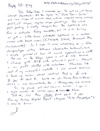
|
2023 jan 19

|
2022 nov 9

|
More... |
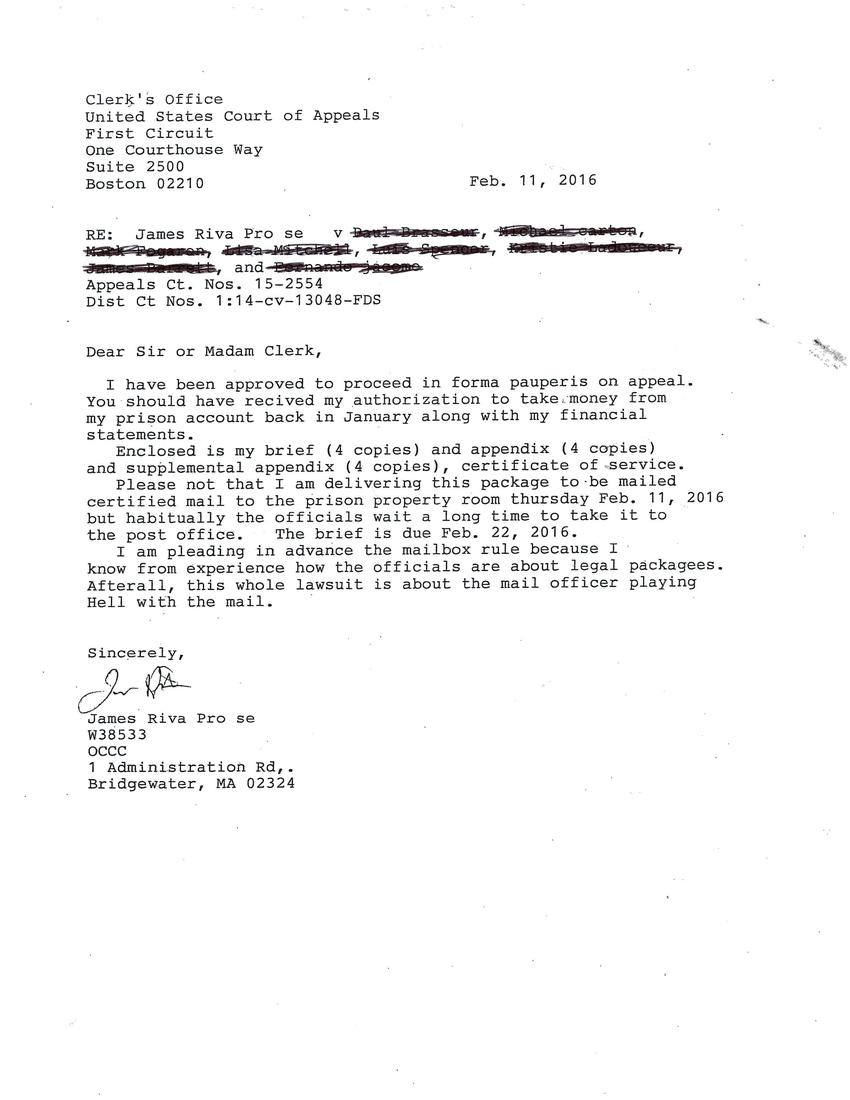
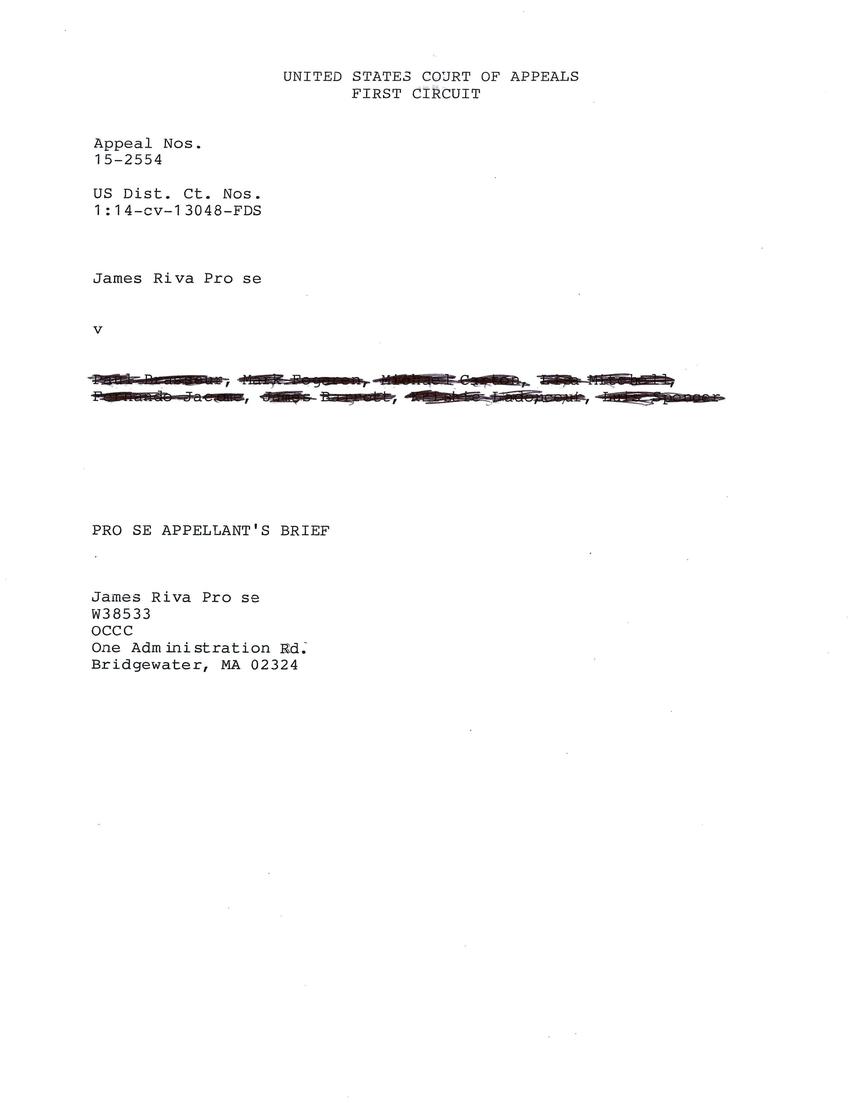
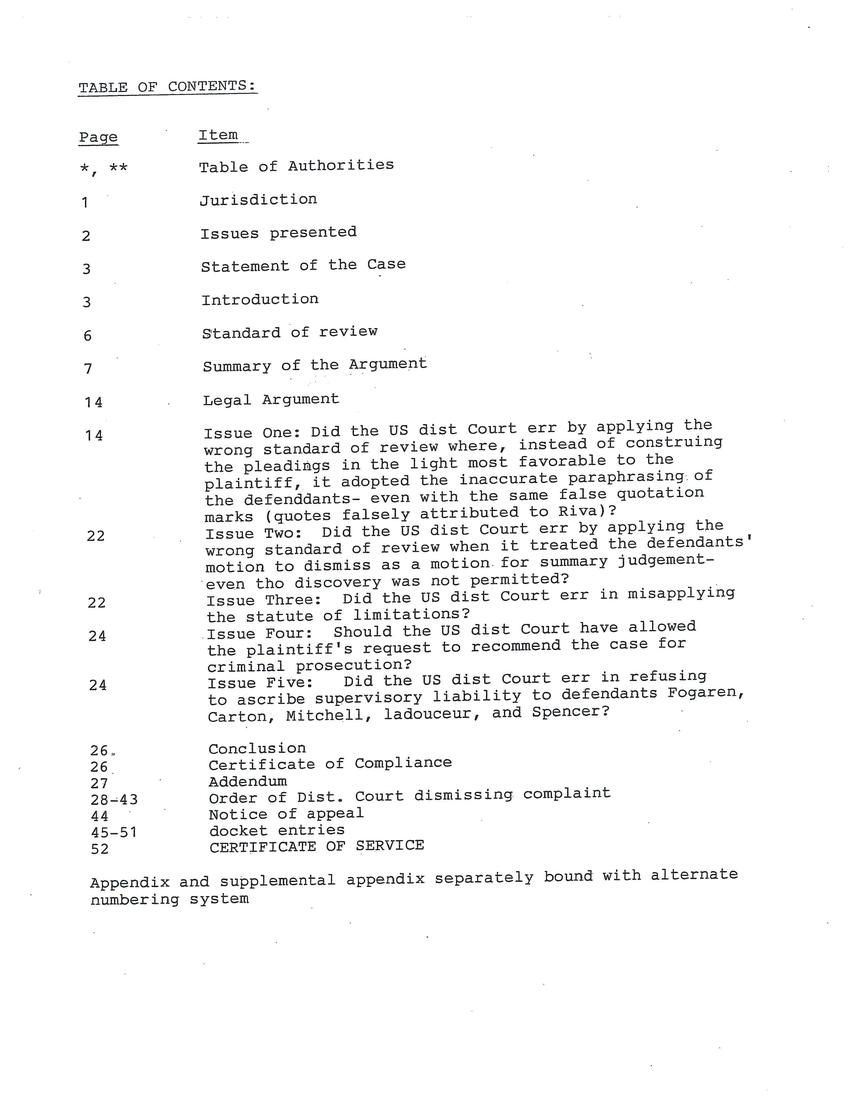
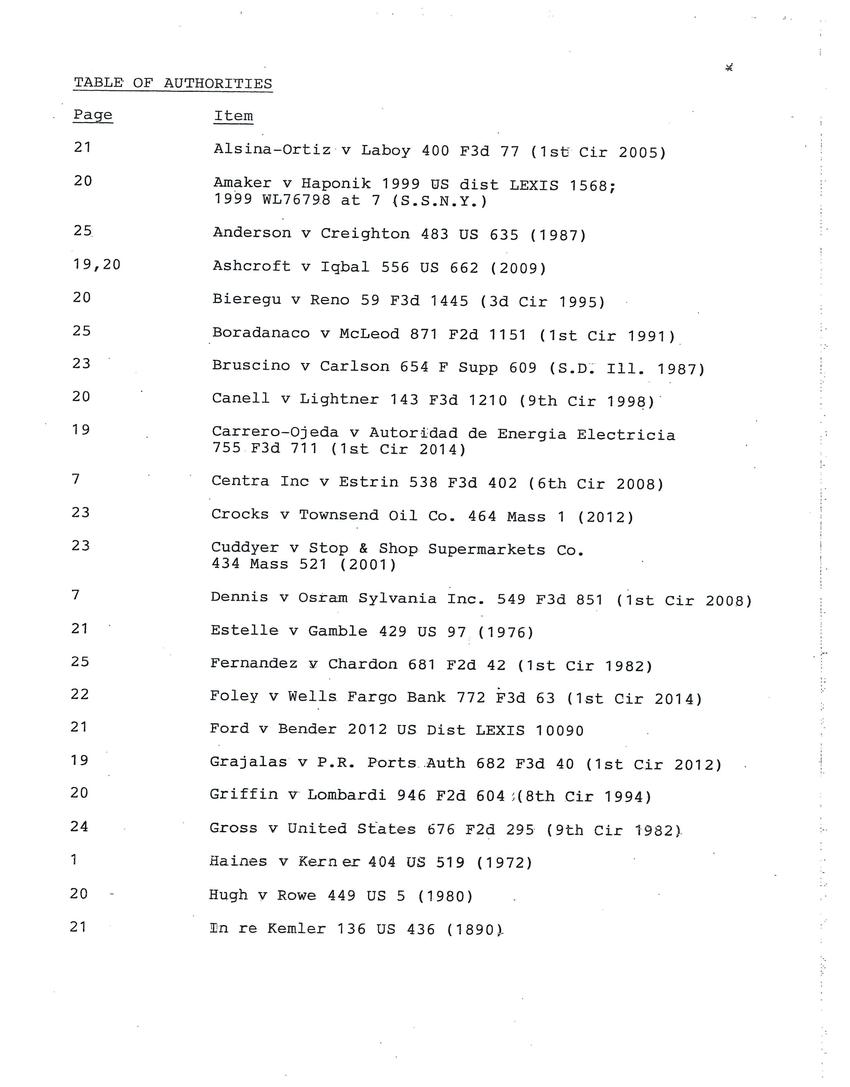
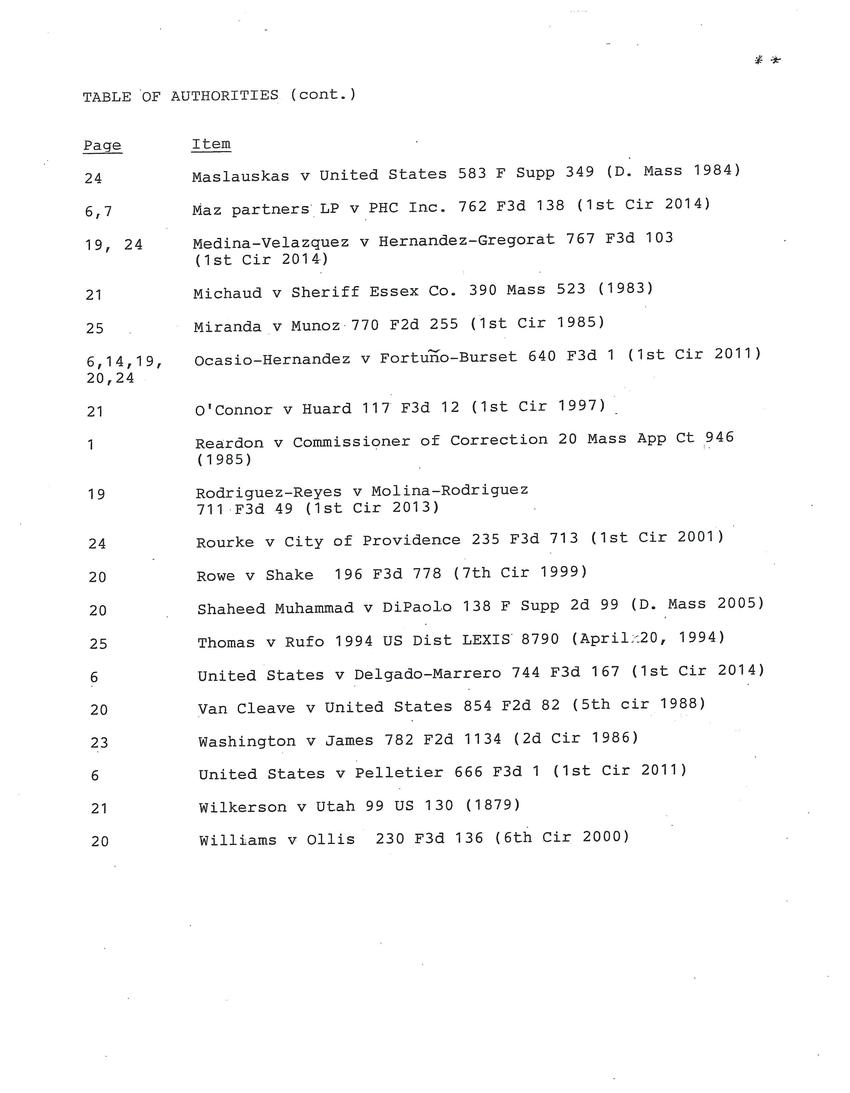
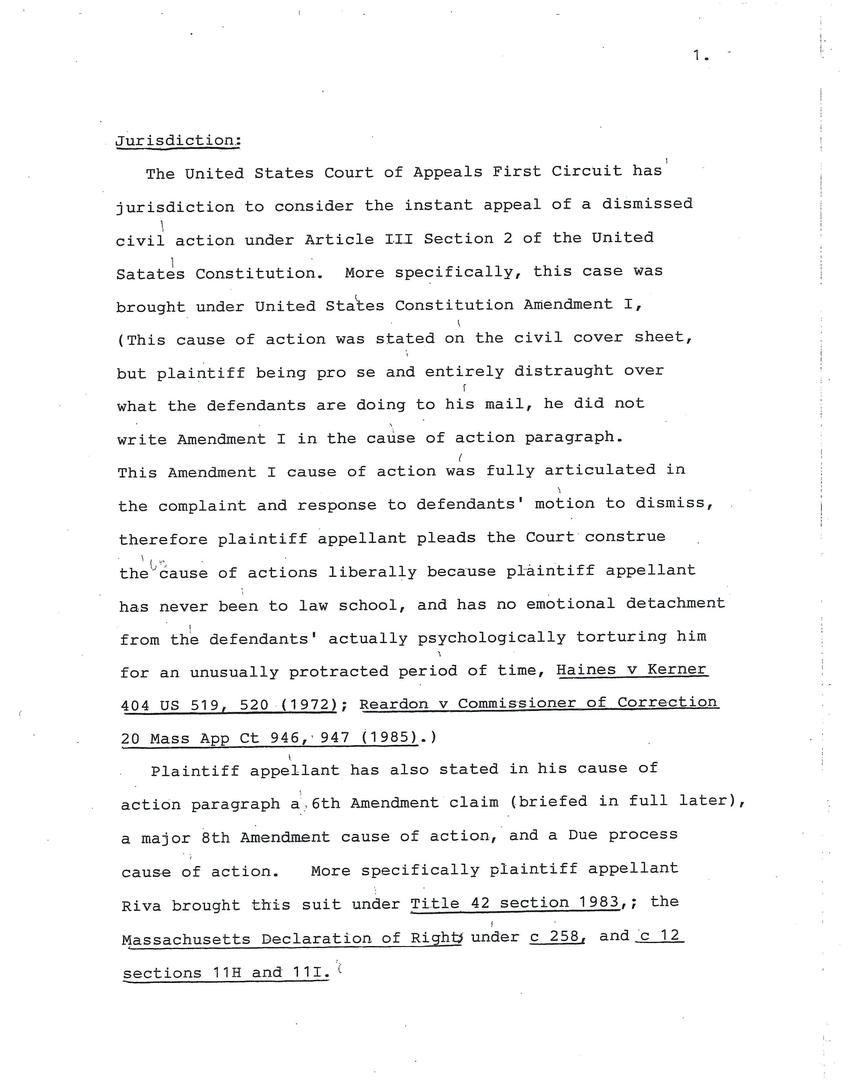

Replies